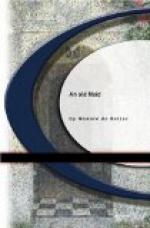Madame Granson, Mariette, Madame du Coudrai, Madame du Ronceret, and through them the whole town, remarked that Madame du Bousquier entered the church with her left foot,—an omen all the more dreadful because the term Left was beginning to acquire a political meaning. The priest whose duty it was to read the opening formula opened his book by chance at the De Profundis. Thus the marriage was accompanied by circumstances so fateful, so alarming, so annihilating that no one dared to augur well of it. Matters, in fact, went from bad to worse. There was no wedding party; the married pair departed immediately for Prebaudet. Parisian customs, said the community, were about to triumph over time-honored provincial ways.
The marriage of Jacquelin and Josette now took place: it was gay; and they were the only two persons in Alencon who refuted the sinister prophecies relating to the marriage of their mistress.
Du Bousquier determined to use the proceeds of the sale of his late residence in restoring and modernizing the hotel Cormon. He decided to remain through two seasons at Prebaudet, and took the Abbe de Sponde with them. This news spread terror through the town, where every individual felt that du Bousquier was about to drag the community into the fatal path of “comfort.” This fear increased when the inhabitants of Alencon saw the bridegroom driving in from Prebaudet one morning to inspect his works, in a fine tilbury drawn by a new horse, having Rene at his side in livery. The first act of his administration had been to place his wife’s savings on the Grand-Livre, which was then quoted at 67 fr. 50 cent. In the space of one year, during which he played constantly for a rise, he made himself a personal fortune almost as considerable as that of his wife.
But all these foreboding prophecies, these perturbing innovations, were superseded and surpassed by an event connected with this marriage which gave a still more fatal aspect to it.
On the very evening of the ceremony, Athanase and his mother were sitting, after their dinner, over a little fire of fagots, which the servant lighted usually at dessert.
“Well, we will go this evening to the du Roncerets’, inasmuch as we have lost Mademoiselle Cormon,” said Madame Granson. “Heavens! how shall I ever accustom myself to call her Madame du Bousquier! that name burns my lips.”
Athanase looked at his mother with a constrained and melancholy air; he could not smile; but he seemed to wish to welcome that naive sentiment which soothed his wound, though it could not cure his anguish.
“Mamma,” he said, in the voice of his childhood, so tender was it, and using the name he had abandoned for several years,—“my dear mamma, do not let us go out just yet; it is so pleasant here before the fire.”
The mother heard, without comprehending, that supreme prayer of a mortal sorrow.
“Yes, let us stay, my child,” she said. “I like much better to talk with you and listen to your projects than to play at boston and lose my money.”




